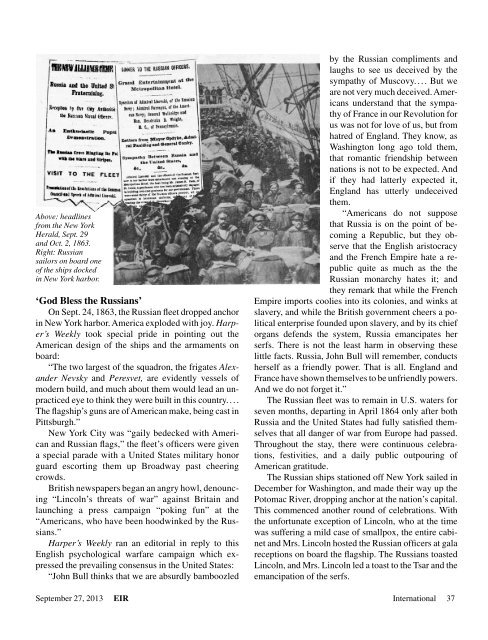150th Anniversary of Russian Navy's Arrival in New York Harbor
150th Anniversary of Russian Navy's Arrival in New York Harbor
150th Anniversary of Russian Navy's Arrival in New York Harbor
Create successful ePaper yourself
Turn your PDF publications into a flip-book with our unique Google optimized e-Paper software.
Above: headl<strong>in</strong>es<br />
from the <strong>New</strong> <strong>York</strong><br />
Herald, Sept. 29<br />
and Oct. 2, 1863.<br />
Right: <strong>Russian</strong><br />
sailors on board one<br />
<strong>of</strong> the ships docked<br />
<strong>in</strong> <strong>New</strong> <strong>York</strong> harbor.<br />
‘God Bless the <strong>Russian</strong>s’<br />
On Sept. 24, 1863, the <strong>Russian</strong> fleet dropped anchor<br />
<strong>in</strong> <strong>New</strong> <strong>York</strong> harbor. America exploded with joy. Harper’s<br />
Weekly took special pride <strong>in</strong> po<strong>in</strong>t<strong>in</strong>g out the<br />
American design <strong>of</strong> the ships and the armaments on<br />
board:<br />
“The two largest <strong>of</strong> the squadron, the frigates Alexander<br />
Nevsky and Peresvet, are evidently vessels <strong>of</strong><br />
modern build, and much about them would lead an unpracticed<br />
eye to th<strong>in</strong>k they were built <strong>in</strong> this country. . . .<br />
The flagship’s guns are <strong>of</strong> American make, be<strong>in</strong>g cast <strong>in</strong><br />
Pittsburgh.”<br />
<strong>New</strong> <strong>York</strong> City was “gaily bedecked with American<br />
and <strong>Russian</strong> flags,” the fleet’s <strong>of</strong>ficers were given<br />
a special parade with a United States military honor<br />
guard escort<strong>in</strong>g them up Broadway past cheer<strong>in</strong>g<br />
crowds.<br />
British newspapers began an angry howl, denounc<strong>in</strong>g<br />
“L<strong>in</strong>coln’s threats <strong>of</strong> war” aga<strong>in</strong>st Brita<strong>in</strong> and<br />
launch<strong>in</strong>g a press campaign “pok<strong>in</strong>g fun” at the<br />
“Americans, who have been hoodw<strong>in</strong>ked by the <strong>Russian</strong>s.”<br />
Harper’s Weekly ran an editorial <strong>in</strong> reply to this<br />
English psychological warfare campaign which expressed<br />
the prevail<strong>in</strong>g consensus <strong>in</strong> the United States:<br />
“John Bull th<strong>in</strong>ks that we are absurdly bamboozled<br />
by the <strong>Russian</strong> compliments and<br />
laughs to see us deceived by the<br />
sympathy <strong>of</strong> Muscovy. . . . But we<br />
are not very much deceived. Americans<br />
understand that the sympathy<br />
<strong>of</strong> France <strong>in</strong> our Revolution for<br />
us was not for love <strong>of</strong> us, but from<br />
hatred <strong>of</strong> England. They know, as<br />
Wash<strong>in</strong>gton long ago told them,<br />
that romantic friendship between<br />
nations is not to be expected. And<br />
if they had latterly expected it,<br />
England has utterly undeceived<br />
them.<br />
“Americans do not suppose<br />
that Russia is on the po<strong>in</strong>t <strong>of</strong> becom<strong>in</strong>g<br />
a Republic, but they observe<br />
that the English aristocracy<br />
and the French Empire hate a republic<br />
quite as much as the the<br />
<strong>Russian</strong> monarchy hates it; and<br />
they remark that while the French<br />
Empire imports coolies <strong>in</strong>to its colonies, and w<strong>in</strong>ks at<br />
slavery, and while the British government cheers a political<br />
enterprise founded upon slavery, and by its chief<br />
organs defends the system, Russia emancipates her<br />
serfs. There is not the least harm <strong>in</strong> observ<strong>in</strong>g these<br />
little facts. Russia, John Bull will remember, conducts<br />
herself as a friendly power. That is all. England and<br />
France have shown themselves to be unfriendly powers.<br />
And we do not forget it.”<br />
The <strong>Russian</strong> fleet was to rema<strong>in</strong> <strong>in</strong> U.S. waters for<br />
seven months, depart<strong>in</strong>g <strong>in</strong> April 1864 only after both<br />
Russia and the United States had fully satisfied themselves<br />
that all danger <strong>of</strong> war from Europe had passed.<br />
Throughout the stay, there were cont<strong>in</strong>uous celebrations,<br />
festivities, and a daily public outpour<strong>in</strong>g <strong>of</strong><br />
American gratitude.<br />
The <strong>Russian</strong> ships stationed <strong>of</strong>f <strong>New</strong> <strong>York</strong> sailed <strong>in</strong><br />
December for Wash<strong>in</strong>gton, and made their way up the<br />
Potomac River, dropp<strong>in</strong>g anchor at the nation’s capital.<br />
This commenced another round <strong>of</strong> celebrations. With<br />
the unfortunate exception <strong>of</strong> L<strong>in</strong>coln, who at the time<br />
was suffer<strong>in</strong>g a mild case <strong>of</strong> smallpox, the entire cab<strong>in</strong>et<br />
and Mrs. L<strong>in</strong>coln hosted the <strong>Russian</strong> <strong>of</strong>ficers at gala<br />
receptions on board the flagship. The <strong>Russian</strong>s toasted<br />
L<strong>in</strong>coln, and Mrs. L<strong>in</strong>coln led a toast to the Tsar and the<br />
emancipation <strong>of</strong> the serfs.<br />
September 27, 2013 EIR International 37
















